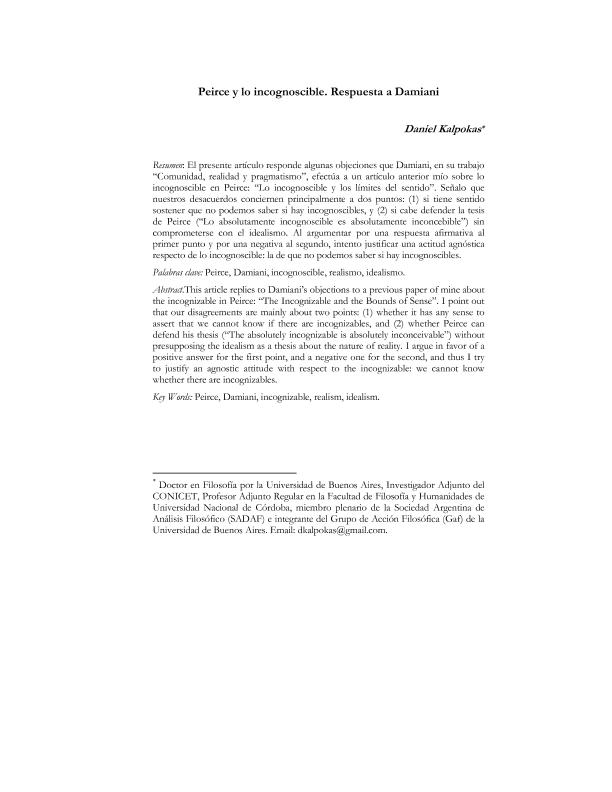Artículo
El presente artículo responde algunas objeciones que Damiani, en su trabajo “Comunidad, realidad y pragmatismo”, efectúa a un artículo anterior mío sobre lo incognoscible en Peirce: “Lo incognoscible y los límites del sentido”. Señalo que nuestros desacuerdos conciernen principalmente a dos puntos: (1) si tiene sentido sostener que no podemos saber si hay incognoscibles, y (2) si cabe defender la tesis de Peirce (“Lo absolutamente incognoscible es absolutamente inconcebible”) sin comprometerse con el idealismo. Al argumentar por una respuesta afirmativa al primer punto y por una negativa al segundo, intento justificar una actitud agnóstica respecto de lo incognoscible: la de que no podemos saber si hay incognoscibles This article replies to Damiani’s objections to a previous paper of mine about the incognizable in Peirce: “The Incognizable and the Bounds of Sense”. I point out that our disagreements are mainly about two points: (1) whether it has any sense to assert that we cannot know if there are incognizables, and (2) whether Peirce can defend his thesis (“The absolutely incognizable is absolutely inconceivable”) without presupposing the idealism as a thesis about the nature of reality. I argue in favor of a positive answer for the first point, and a negative one for the second, and thus I try to justify an agnostic attitude with respect to the incognizable: we cannot know whether there are incognizables
Peirce y lo incognoscible. Respuesta a Damiani
Fecha de publicación:
12/2011
Editorial:
Asociación Revista de Filosofía de Santa Fe
Revista:
Tópicos
e-ISSN:
1666-485X
Idioma:
Español
Tipo de recurso:
Artículo publicado
Clasificación temática:
Resumen
Palabras clave:
Peirce
,
Damiani
,
Incognoscible
,
Realismo
,
Idealismo
Archivos asociados
Licencia
Identificadores
Colecciones
Articulos(IDH)
Articulos de INSTITUTO DE HUMANIDADES
Articulos de INSTITUTO DE HUMANIDADES
Citación
Kalpokas, Daniel Enrique; Peirce y lo incognoscible. Respuesta a Damiani; Asociación Revista de Filosofía de Santa Fe; Tópicos; 22; 12-2011; 1-11
Compartir




